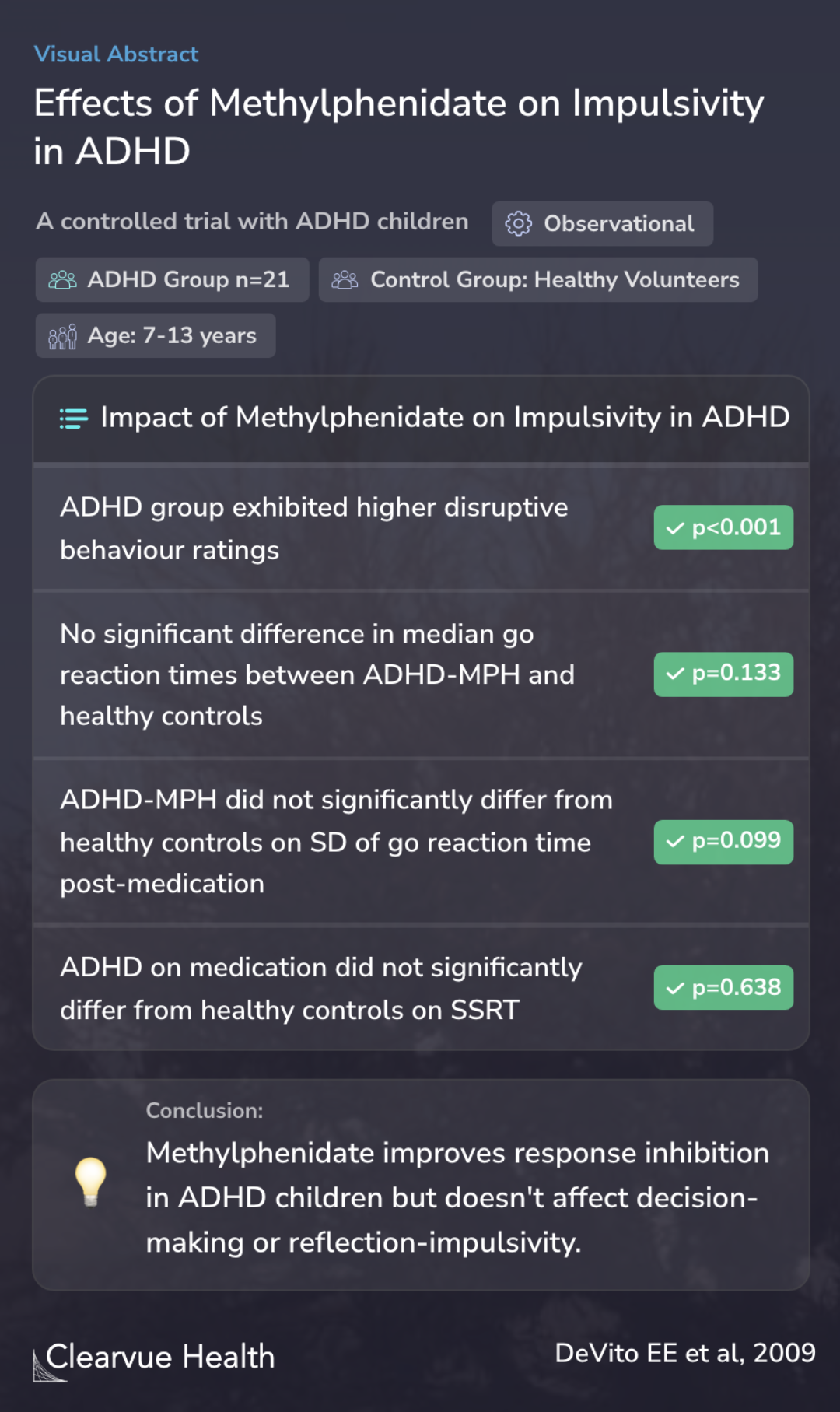Methylphenidate improves response inhibition but not reflection-impulsivity in children with attention deficit hyperactivity disorder (ADHD)
Effects of Methylphenidate on Impulsivity in ADHD
DeVito EE, Blackwell AD, Clark L, Kent L, Dezsery AM, Turner DC, Aitken MR, Sahakian BJ

Objectives
The main focus of the study was to understand how a drug called methylphenidate, often used to treat ADHD, affects children's impulsivity. Impulsivity is a key symptom of ADHD, and it involves acting quickly without much thought. The study aimed to see if methylphenidate could help with two types of impulsivity: doing things quickly without much thinking (reflection-impulsivity) and the ability to stop oneself from doing something (response inhibition). They also compared the results with children who do not have ADHD.
Impulsivity is a cardinal feature of attention deficit hyperactivity disorder (ADHD), which is thought to underlie many of the cognitive and behavioural symptoms associated with the disorder. Impairments on some measures of impulsivity have been shown to be responsive to pharmacotherapy....
Methods
The study involved 21 boys, aged between 7 and 13 years, who were diagnosed with ADHD. These boys took part in a carefully controlled trial where they were given either a placebo (a medicine with no active ingredient) or methylphenidate. Their performance on two specific tasks, the Information Sampling Task (IST) and the Stop Signal Task (SST), was measured. These tasks help measure how impulsive someone is. Additionally, a group of healthy children of the same age and educational background were tested using the same methods, but without any medication.
Twenty-one boys (aged 7-13 years) diagnosed with ADHD underwent a double-blind, placebo-controlled trial of MPH (0.5 mg/kg) during which they performed the Information Sampling Task (IST) and the Stop Signal Task. A healthy age- and education-matched control group was tested on the same ...
Results
The results showed that children with ADHD struggled more with response inhibition, meaning they found it harder to stop themselves from doing something once they had started. However, they did not show issues with reflection-impulsivity on the IST, which means they didn't act more quickly without thinking compared to their peers. Interestingly, even though they thought as much as their peers before acting, they still made more poor decisions. Methylphenidate improved their ability to stop themselves (response inhibition) and made their responses less variable, but it did not help with their decision-making or quick, unthoughtful actions.
Children with ADHD were impaired on measures of response inhibition, but did not demonstrate reflection-impulsivity on the IST. However, despite sampling a similar amount of information as their peers, the ADHD group made more poor decisions. MPH improved performance on measures of respo...
Conclusions
The study concludes that methylphenidate has a specific impact on children with ADHD. It helps them with one aspect of impulsivity, which is response inhibition, but it does not improve their decision-making abilities or reduce their tendency to act quickly without thinking. This finding is significant as it helps understand which aspects of ADHD can be managed with medication and which cannot.
MPH differentially affected two forms of impulsivity in children with ADHD and failed to ameliorate their poor decision-making on the information sampling test.
Key Takeaways
Context
This study fits into a larger picture of understanding ADHD and impulsivity. Other studies, like the one by Nandam et al. in 2011, found that methylphenidate is unique in improving performance and reducing impulsivity in cognitive tasks. This suggests that one of the key ways stimulant medications like Ritalin (the brand name for methylphenidate) help people with ADHD is by reducing impulsiveness and improving focus. Additionally, defining impulsivity in ADHD and understanding the effectiveness of medications like Adderall and Ritalin in improving impulsivity and response inhibition is crucial. There's also growing interest in the potential of SSRIs, a different type of medication, in reducing impulsivity, especially in specific groups like violent offenders.